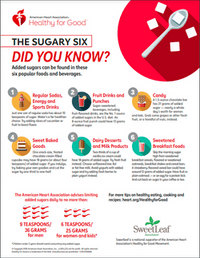
Tips for Cutting Down on Sugar
Keeping tabs on how much sugar you’re swallowing is an important part of a heart-healthy lifestyle, especially if you’ve been diagnosed with diabetes or prediabetes. The empty calories from added sugars in desserts, some drinks and candy can lead to weight gain and spikes in blood glucose levels.
The good news is that cutting down on sugar may be easier than you think.
Get started cutting down on sugar with these tips:
- Toss the table sugar (white and brown), syrup, honey, and molasses. Cut back on the amount of sugar added to things you eat or drink regularly like cereal, pancakes, coffee, or tea. Try cutting the usual amount of sugar you add by half and wean down from there.
- Swap out the soda. Water is best, but if you want something sweet to drink or are trying to lose weight, diet drinks can be a better choice than sugary drinks.
- Eat fresh, frozen, dried, or canned fruits. Choose fruit canned in water or natural juice. Avoid fruit canned in syrup, especially heavy syrup. Drain and rinse in a colander to remove excess syrup or juice.
- Compare food labels and choose products with the lowest amounts of added sugars. Dairy and fruit products will contain some natural sugars. Added sugars can be identified in the ingredients list.
- Add fruit. Instead of adding sugar to cereal or oatmeal, try fresh fruit (bananas, cherries or strawberries) or dried fruit (raisins, cranberries or apricots).
- Cut the serving back. When baking cookies, brownies or cakes, cut the sugar called for in your recipe by one-third to one-half. Often you won’t notice the difference.
- Try extracts. Instead of adding sugar in recipes, use extracts like almond, vanilla, orange or lemon.
- Replace it completely. Enhance foods with spices instead of sugar. Try ginger, allspice, cinnamon or nutmeg.
- Substitute. Switch out sugar with unsweetened applesauce in recipes (use equal amounts).
- Limit Non-nutritive Sweeteners. If you are trying to lose weight, a temporary fix to satisfying your sweet tooth may be with non-nutritive sweeteners. But watch out! Make sure that swapping sugary options for non-nutritive sweeteners now doesn’t lead to eating more later.
Written by American Heart Association editorial staff and reviewed by science and medicine advisers.
